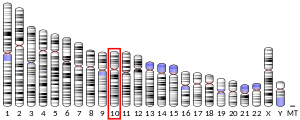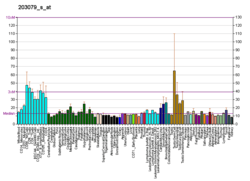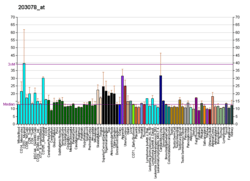CUL2
Cullin-2 is a protein that in humans is encoded by the CUL2 gene.[5][6]
Interactions
CUL2 has been shown to interact with:
gollark: I don't know.
gollark: If you don't know how to use an existing library switching to OC won't help you.
gollark: Just use someone's sha256 library.
gollark: You can do hashing in CC fine...
gollark: <@186486131565527040>
References
- GRCh38: Ensembl release 89: ENSG00000108094 - Ensembl, May 2017
- GRCm38: Ensembl release 89: ENSMUSG00000024231 - Ensembl, May 2017
- "Human PubMed Reference:". National Center for Biotechnology Information, U.S. National Library of Medicine.
- "Mouse PubMed Reference:". National Center for Biotechnology Information, U.S. National Library of Medicine.
- Kipreos ET, Lander LE, Wing JP, He WW, Hedgecock EM (Aug 1996). "cul-1 is required for cell cycle exit in C. elegans and identifies a novel gene family". Cell. 85 (6): 829–39. doi:10.1016/S0092-8674(00)81267-2. PMID 8681378.
- "Entrez Gene: CUL2 cullin 2".
- Menon S, Tsuge T, Dohmae N, Takio K, Wei N (2008). "Association of SAP130/SF3b-3 with Cullin-RING ubiquitin ligase complexes and its regulation by the COP9 signalosome". BMC Biochem. 9: 1. doi:10.1186/1471-2091-9-1. PMC 2265268. PMID 18173839.
- Min KW, Hwang JW, Lee JS, Park Y, Tamura TA, Yoon JB (May 2003). "TIP120A associates with cullins and modulates ubiquitin ligase activity". J. Biol. Chem. 278 (18): 15905–10. doi:10.1074/jbc.M213070200. PMID 12609982.
- Kim AY, Bommeljé CC, Lee BE, Yonekawa Y, Choi L, Morris LG, Huang G, Kaufman A, Ryan RJ, Hao B, Ramanathan Y, Singh B (Nov 2008). "SCCRO (DCUN1D1) is an essential component of the E3 complex for neddylation". J. Biol. Chem. 283 (48): 33211–20. doi:10.1074/jbc.M804440200. PMC 2586271. PMID 18826954.
- Dias DC, Dolios G, Wang R, Pan ZQ (Dec 2002). "CUL7: A DOC domain-containing cullin selectively binds Skp1.Fbx29 to form an SCF-like complex". Proc. Natl. Acad. Sci. U.S.A. 99 (26): 16601–6. doi:10.1073/pnas.252646399. PMC 139190. PMID 12481031.
- Ohta T, Michel JJ, Schottelius AJ, Xiong Y (Apr 1999). "ROC1, a homolog of APC11, represents a family of cullin partners with an associated ubiquitin ligase activity". Mol. Cell. 3 (4): 535–41. doi:10.1016/s1097-2765(00)80482-7. PMID 10230407.
- Kamura T, Burian D, Yan Q, Schmidt SL, Lane WS, Querido E, Branton PE, Shilatifard A, Conaway RC, Conaway JW (Aug 2001). "Muf1, a novel Elongin BC-interacting leucine-rich repeat protein that can assemble with Cul5 and Rbx1 to reconstitute a ubiquitin ligase". J. Biol. Chem. 276 (32): 29748–53. doi:10.1074/jbc.M103093200. PMID 11384984.
- Ewing RM, Chu P, Elisma F, Li H, Taylor P, Climie S, McBroom-Cerajewski L, Robinson MD, O'Connor L, Li M, Taylor R, Dharsee M, Ho Y, Heilbut A, Moore L, Zhang S, Ornatsky O, Bukhman YV, Ethier M, Sheng Y, Vasilescu J, Abu-Farha M, Lambert JP, Duewel HS, Stewart II, Kuehl B, Hogue K, Colwill K, Gladwish K, Muskat B, Kinach R, Adams SL, Moran MF, Morin GB, Topaloglou T, Figeys D (2007). "Large-scale mapping of human protein-protein interactions by mass spectrometry". Mol. Syst. Biol. 3: 89. doi:10.1038/msb4100134. PMC 1847948. PMID 17353931.
- Ohh M, Takagi Y, Aso T, Stebbins CE, Pavletich NP, Zbar B, Conaway RC, Conaway JW, Kaelin WG (Dec 1999). "Synthetic peptides define critical contacts between elongin C, elongin B, and the von Hippel-Lindau protein". J. Clin. Invest. 104 (11): 1583–91. doi:10.1172/JCI8161. PMC 481054. PMID 10587522.
- Hacker KE, Lee CM, Rathmell WK (2008). Zhang B (ed.). "VHL type 2B mutations retain VBC complex form and function". PLoS ONE. 3 (11): e3801. doi:10.1371/journal.pone.0003801. PMC 2583047. PMID 19030229.
External links
- Human CUL2 genome location and CUL2 gene details page in the UCSC Genome Browser.
Further reading
- Kibel A, Iliopoulos O, DeCaprio JA, Kaelin WG (1995). "Binding of the von Hippel-Lindau tumor suppressor protein to Elongin B and C". Science. 269 (5229): 1444–6. doi:10.1126/science.7660130. PMID 7660130.
- Pause A, Lee S, Worrell RA, Chen DY, Burgess WH, Linehan WM, Klausner RD (1997). "The von Hippel-Lindau tumor-suppressor gene product forms a stable complex with human CUL-2, a member of the Cdc53 family of proteins". Proc. Natl. Acad. Sci. U.S.A. 94 (6): 2156–61. doi:10.1073/pnas.94.6.2156. PMC 20057. PMID 9122164.
- Lonergan KM, Iliopoulos O, Ohh M, Kamura T, Conaway RC, Conaway JW, Kaelin WG (1998). "Regulation of hypoxia-inducible mRNAs by the von Hippel-Lindau tumor suppressor protein requires binding to complexes containing elongins B/C and Cul2". Mol. Cell. Biol. 18 (2): 732–41. doi:10.1128/mcb.18.2.732. PMC 108784. PMID 9447969.
- Wada H, Yeh ET, Kamitani T (1999). "Identification of NEDD8-conjugation site in human cullin-2". Biochem. Biophys. Res. Commun. 257 (1): 100–5. doi:10.1006/bbrc.1999.0339. PMID 10092517.
- Ohta T, Michel JJ, Schottelius AJ, Xiong Y (1999). "ROC1, a homolog of APC11, represents a family of cullin partners with an associated ubiquitin ligase activity". Mol. Cell. 3 (4): 535–41. doi:10.1016/S1097-2765(00)80482-7. PMID 10230407.
- Pause A, Peterson B, Schaffar G, Stearman R, Klausner RD (1999). "Studying interactions of four proteins in the yeast two-hybrid system: structural resemblance of the pVHL/elongin BC/hCUL-2 complex with the ubiquitin ligase complex SKP1/cullin/F-box protein". Proc. Natl. Acad. Sci. U.S.A. 96 (17): 9533–8. doi:10.1073/pnas.96.17.9533. PMC 22243. PMID 10449727.
- Iwai K, Yamanaka K, Kamura T, Minato N, Conaway RC, Conaway JW, Klausner RD, Pause A (1999). "Identification of the von Hippel-lindau tumor-suppressor protein as part of an active E3 ubiquitin ligase complex". Proc. Natl. Acad. Sci. U.S.A. 96 (22): 12436–41. doi:10.1073/pnas.96.22.12436. PMC 22941. PMID 10535940.
- Hori T, Osaka F, Chiba T, Miyamoto C, Okabayashi K, Shimbara N, Kato S, Tanaka K (2000). "Covalent modification of all members of human cullin family proteins by NEDD8". Oncogene. 18 (48): 6829–34. doi:10.1038/sj.onc.1203093. PMID 10597293.
- Kamura T, Sato S, Iwai K, Czyzyk-Krzeska M, Conaway RC, Conaway JW (2000). "Activation of HIF1alpha ubiquitination by a reconstituted von Hippel-Lindau (VHL) tumor suppressor complex". Proc. Natl. Acad. Sci. U.S.A. 97 (19): 10430–5. doi:10.1073/pnas.190332597. PMC 27041. PMID 10973499.
- Lyapina S, Cope G, Shevchenko A, Serino G, Tsuge T, Zhou C, Wolf DA, Wei N, Shevchenko A, Deshaies RJ (2001). "Promotion of NEDD-CUL1 conjugate cleavage by COP9 signalosome". Science. 292 (5520): 1382–5. doi:10.1126/science.1059780. PMID 11337588.
- Kamura T, Burian D, Yan Q, Schmidt SL, Lane WS, Querido E, Branton PE, Shilatifard A, Conaway RC, Conaway JW (2001). "Muf1, a novel Elongin BC-interacting leucine-rich repeat protein that can assemble with Cul5 and Rbx1 to reconstitute a ubiquitin ligase". J. Biol. Chem. 276 (32): 29748–53. doi:10.1074/jbc.M103093200. PMID 11384984.
- Ohh M, Kim WY, Moslehi JJ, Chen Y, Chau V, Read MA, Kaelin WG (2002). "An intact NEDD8 pathway is required for Cullin-dependent ubiquitylation in mammalian cells". EMBO Rep. 3 (2): 177–82. doi:10.1093/embo-reports/kvf028. PMC 1083969. PMID 11818338.
- Min JH, Yang H, Ivan M, Gertler F, Kaelin WG, Pavletich NP (2002). "Structure of an HIF-1alpha -pVHL complex: hydroxyproline recognition in signaling". Science. 296 (5574): 1886–9. doi:10.1126/science.1073440. PMID 12004076.
- Brower CS, Sato S, Tomomori-Sato C, Kamura T, Pause A, Stearman R, Klausner RD, Malik S, Lane WS, Sorokina I, Roeder RG, Conaway JW, Conaway RC (2002). "Mammalian mediator subunit mMED8 is an Elongin BC-interacting protein that can assemble with Cul2 and Rbx1 to reconstitute a ubiquitin ligase". Proc. Natl. Acad. Sci. U.S.A. 99 (16): 10353–8. doi:10.1073/pnas.162424199. PMC 124918. PMID 12149480.
- Min KW, Hwang JW, Lee JS, Park Y, Tamura TA, Yoon JB (2003). "TIP120A associates with cullins and modulates ubiquitin ligase activity". J. Biol. Chem. 278 (18): 15905–10. doi:10.1074/jbc.M213070200. PMID 12609982.
- Yan Q, Kamura T, Cai Y, Jin J, Ivan M, Mushegian A, Conaway RC, Conaway JW (2004). "Identification of Elongin C and Skp1 sequences that determine Cullin selection". J. Biol. Chem. 279 (41): 43019–26. doi:10.1074/jbc.M408018200. PMID 15280393.
This article is issued from Wikipedia. The text is licensed under Creative Commons - Attribution - Sharealike. Additional terms may apply for the media files.





